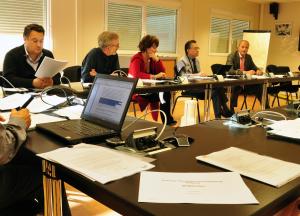Safeguarding ITER inventions
11 Feb 2011
-
Robert Arnoux
The issue of intellectual property is a serious one that has implications way beyond ITER. The IP Board is scheduled to meet every six weeks and will convene for as long as the ITER Project exists.
In the course of ITER's life, many things will be invented: new processes and innovative materials will be developed; unprecedented concepts and exotic tools will most certainly be elaborated. "We are building a device that is at the cutting edge of technology," says David Campbell (Directorate for Plasma Operation) and Chair of the newly-established Intellectual Property (IP) Board. "People will invent ... and their inventions will need to be protected."
The issue is a very serious one that has implications way beyond ITER. When fusion reactors are built the potential value generated by inventions and technological breakthroughs will be considerable.
In conformity with the Rules on Intellectual Property Management and Dissemination of Information that were adopted at the fifth meeting of the ITER Council in November 2009, an "IP Board" was established this week to assess "all aspects of intellectual property protection within the ITER Organization."
One of the founding principles of ITER is that knowledge acquired within the project is freely shared between the contributing Members. "We have to make sure that knowledge generated within ITER can be exploited effectively by the Members in their fusion development programs," says David Campbell.
While intellectual property on inventions or breakthrough technologies is pretty clear-cut, the notion of "background intellectual property" is more delicate to address. "Background intellectual property," explains the IP Board Chair, "is, for example, intellectual property that belongs to a company or institution, that is then used in fabricating an ITER component and that we need to access in order for instance to maintain the component during ITER operation. The project will most likely involve a lot of background intellectual property and we have to ensure that an adaquate protection system creates trust between us, the Domestic Agencies and industry."
The IP Board is scheduled to meet every six weeks and will convene for as long as the ITER Project exists. One item on its current agenda is designing a reward system to compensate "ITER inventors" who generate potential value; another is promoting the intellectual property training program, so that people recognize intellectual property when they see it, says David.


